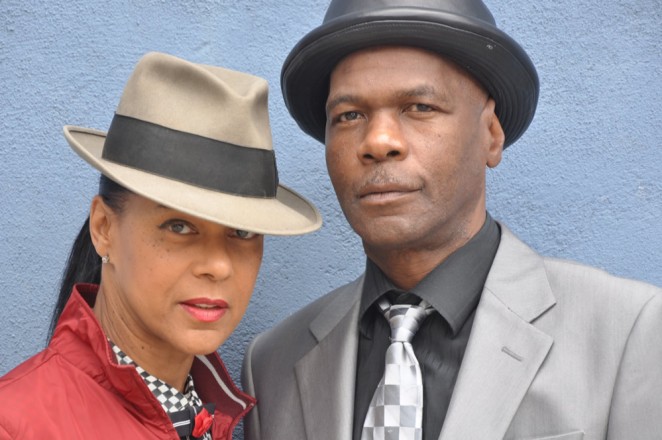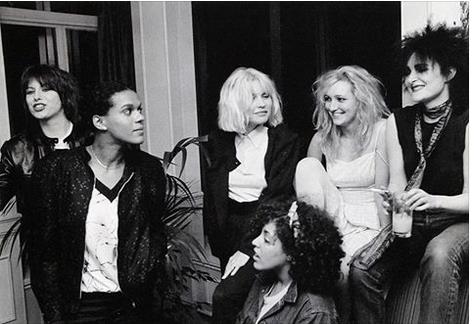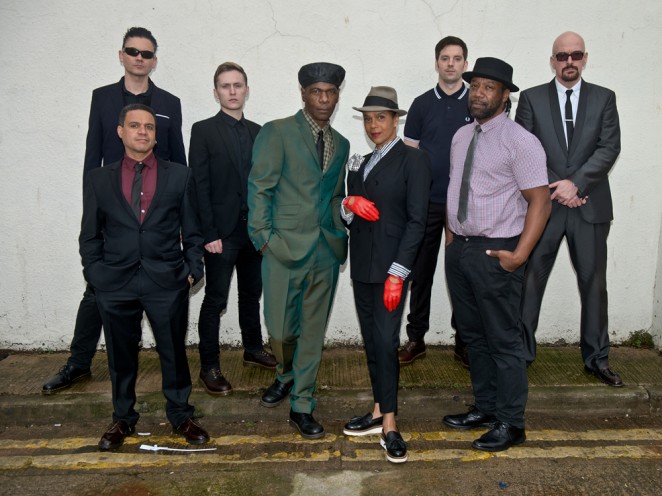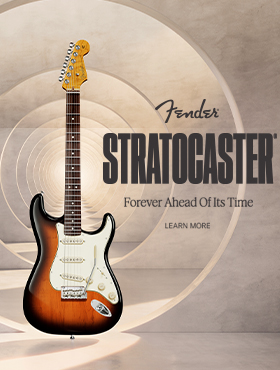
For many, the stereotypical depiction of punk rock in the UK in the late 70s, early 80s was of torn shirts, ripped jeans, safety pin jewelry and scowling faces … the Sid Vicious look. Diametrically, the ska movement which emerged at the same time, was symbolised by Rude Boys (and girls), who dressed to the nines in sharp suits, thin ties and pork pie hats. The beat structure of the two music genres was miles apart too, however the energy and attitude was exactly the same. During the Thatcher era of hardline politics, which led to mass unemployment, record high interest rates, and increased taxes, there was an air of us against them and grass roots level musicians of all backgrounds suddenly found a voice. It was out of this atmosphere, that the 2 Tone record label surfaced, responsible for the introduction of ska bands such as The Specials, Bad Manners, Madness, The Beat and The Selecter fronted by Pauline Black and her sidekick ‘Gaps’ Hedrickson. The Selecter produced a number of highly addictive hits at the time including ‘On My Radio’, ‘Three Minute Hero, and ‘Missing Words’. The band split in 1982, had the occasional come back during ensuing years, then officially got back together again in 2010. They’ve been recording and performing since and in 2016 The Selecter will be in Australia, playing Bluesfest and associated national side shows. Australian Musician’s Greg Phillips was honoured to speak with the amiable Pauline Black about The Selecter’s history and their upcoming Australian tour.
Why do you think ska music was so popular in the punk era. Why did it connect then?
I think a lot of people possibly don’t understand the connection. You’ve got to remember that punk really broke down the barriers in this country. It broke down the barriers between black music and white music. People like John Lydon from the Sex Pistols and The Clash’s Joe Strummer, they had been listening to the reggae music that was coming over to Britain. And young black people here were making music, emulating what was coming over from Jamaica … like Aswad, like Steel Pulse and it was like a big melting pot for a period of time. A lot of reggae bands came out of London like Misty in Roots. We all started listening to each other’s music. Without punk music breaking down those barriers and saying, hey we’ve had enough of those awful 70s supergroups like Genesis and all of that kind of nonsense, you wouldn’t have had that alternative way of looking at things.
Reggae was very much a big part of The Clash’s sound wasn’t it …
Yeah, they took the rhythm and they did something with it. I have always felt that the best musics are hybrid musics, when a couple of things come together… people are looking for different genres to mash up which is what The Clash started doing. Obviously rock music is the datum for a lot of white people and reggae is the datum for a lot of black people around the world. It’s only where the beat is really. It’s either four on or four off! That’s not rocket science but it’s what happens between those four beats that is interesting.

I saw a photo of you recently from 1980 with Debbie Harry, Chrissie Hynde, Siouxsie Sioux, Poly Styrene, and Viv Albertine. Did you often hang out with other artists like that back in the day?
I already knew Chrissie Hynde at that time. Debbie Harry with Blondie were on the same label as we were because 2Tone was put out by Chrysalis Music. We’d bump into each other like you always do at parties or at some function that you end up at. I feel that everyone in that photo had a punk ethic deep down and I don’t mean that they did punk music. Punk is an attitude. It’s not a style of dress or a particular kind of music, it’s an attitude. What that picture really epitomises is really the first women that came out of music that began doing it for themselves and not just standing there or sewing the last sequin on or whatever. It was a different way of looking at music. I love that picture. I love Poly Styrene so much. She is the only one who has fallen off their perch so far. It is so sad not to have her around anymore. But that was definitely sisters doing it for themselves in that photo for sure.
Tell me about Gaps Hendrickson. What’s his greatest asset?
Gaps’ greatest asset? You’d have to ask him. Really, I think Gaps … his greatest asset is that for 35 years since we have been in the band together, we have never had a cross word with each other because we respect each other. What Gaps brings to the table is different to what I bring but if you put the two things together, it creates an enormous energy on stage. We allow each other to ‘get your thing on’ as it were, to be who you want to be on stage. We don’t try to limit what each other does. I feel if you have a situation like that where you respect the musicians that you work with, you will have a far better relationship than if you’re jockeying for position or trying to get one over on somebody else. That would just be anathema to us.
You brought the band back together in 2010 and recorded a new album. You could have just toured and played the music people were familiar with but chose to write new material. I guess your creativity has never wavered?
I feel that a band ought to be as good as their last record. We are musicians. Isn’t that what you are supposed to do? We’re supposed to write music. When bands get back together again, obviously you have to re remind people of yourselves, what you did, what you believe in, what your particular ethos is. All of those things but having done that, you can’t keep doing it year in, year out. People’s minds and patience really shouldn’t last that long but it kind of does. This whole new idea of heritage bands where you’re supposed to guard your heritage and not make any new music in case it is not considered as good as your hits were. I think that is so limiting… and dull. It’s always exciting to play the hits to an audience and they get off on them. The reason they are hits is because they have a classicness to them that is great. I would hate not to be able to go on stage and do things like On My Radio and Too Much Pressure and Missing Words but I feel as though you have to respect your audience as well. They can say to themselves, well, this band has done some new music. I should have a listen and see what I think of it. Even if I don’t like it, at least I should be respectful of the fact that they have bothered. Largely, actually our audience does think that and even better seem to like it. So we keep doing new records.

What are your songwriting tools? How do you document your song ideas?
I write either on guitar or piano. Gaps writes on guitar and we have a really great guy who plays tenor sax, Neil Pyzer-Skeete who was also in Spear of Destiny … he was the saxophonist in that original band. He has a studio, so we write in his studio. We put the whole thing together then take songs to the band and it comes together in a very organic way and it is a very pleasurable experience. It’s not like work.
It takes quite a skilled musician to play ska music properly …
I’m glad you said that because so many people think .. oh ska , reggae, that’s easy. You just go chink, chink and that’s it but no, it is really difficult. It’s like reggae, you can play all the notes in the world but it’s the notes you don’t play, which is the thing that makes it move and makes it reggae or makes it ska. It’s very difficult to arrange a really great ska record. Jerry Dammers of The Specials is the aceist arranger that I know. To make music of that kind of quality is hard and you have to put a lot of skill and patience into it, so I am glad you said that.
You have toured Australia before but you haven’t played Bluesfest with The Selecter have you?
The Selecter hasn’t played Bluesfest but I have. I can’t remember what we were called but it was myself, Ranking Roger from The Beat and Neville Staple from The Specials , it might have been the legends of ska, something cheesy like that. That was around 2009 and it was the first time I had played Australia and my mother lives there. She’d never seen the band or never seen me perform so that was the first time she got to see me perform in Sydney at the Enmore and that was great.
Around 8 years ago when we were in print, we published an all female issue of Australian Musician. It curated by a female artist (Clare Bowditch) and was about female artists working in a male-dominated music world. Initially, Clare the artist who edited the issue had reservations, thinking it might be seen as tokenistic but I said that she and her musician friends had free rein to write whatever they liked, so they did it. More recently though, there’s been a school of thought that we shouldn’t even make a distinction between male or female artists … that we are all purely artists. What are your thoughts? Is there still a need to discuss gender inequality in music or are we doing more damage by separating artists into female and male categories?
I don’t mind being considered a female artist. I am a female black artist. Yes, everybody is an artist but everybody brings something different to the game. I think if there weren’t gender issues in society, if there weren’t racist issues in society, then yeah, we’d all be artists wouldn’t we … but there are those issues. If you want to talk about those things … I want to talk about them from MY perspective, as a black female. That is going be very dissimilar to a white female rock artist. So to say we are all artists .. I mean, we are all human beings too but there’s a lot of catching up for people to do to even accept that.
You recorded the Amy Winehouse song Back to Black before she passed away. What was it about that song that made you want to record it?
It’s just a fantastic song. I mean, I really, really miss Amy. Amy Winehouse had a great interest in ska music. She did ‘Monkey Man’ and one of The Specials’ songs, ‘Hey Little Rich Girl’, and did a ska EP, so really it was a little doff of the hat back towards her and saying I think you are a great songwriter too and we’ll cover one of your tracks. Back to Black was obviously a natural thing, one; because of the name and two; because I wrote an autobiography and it’s divided into 3 sections and the 3rd section is called Back to Black. So there were a lot of different points where it connected.
You have played so many Selecter gigs. Is there one that stands out as the most memorable for you?
I think I would have to say the London show that we played this year which was absolutely fantastic and had such a great energy in a place called the Koko … a wonderful theatre … old music hall kind of theatre. Everything we had been working towards with the new album Subculutre and everything we had been working towards over the past five years, just all came together at that gig. It was one of those times where you feel yourself and the audience are working as one and you can’t put a foot wrong. It was the most satisfying gig I have ever done.
What is the future for The Selecter?
When you have been going for as long as we have, you look at it year by year. Certainly for next year we are booked up until Autumn at the moment. We are going to start the creative process again in the new year and hopefully we will have a new album out by the end of next year or early 2017. Of course we’re coming to Australia next March for Bluesfest and to do some other concerts, so we’re really looking forward to that.
The Selecter’s current album Subculture is available via iTunes etc.


